CANADA
Private property or public space? Encampments spark debate over campus status
Joe Bongiorno
Sat, May 25, 2024
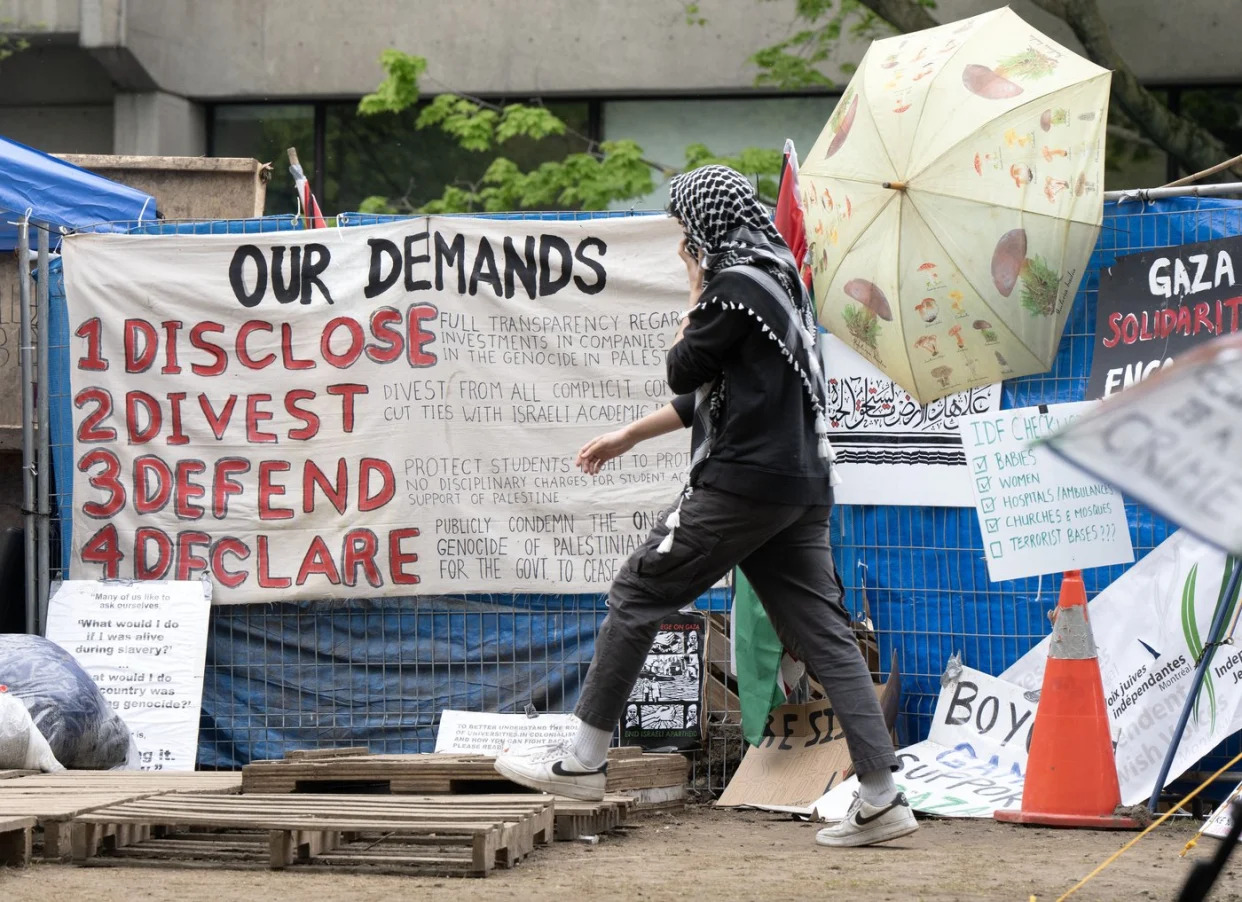
MONTREAL — After four weeks that have featured torrential downpours, blistering heat and two failed legal bids to have them removed, pro-Palestinian protesters remain encamped on McGill University’s downtown campus.
Quebec Minister of Higher Education Pascale Déry said their continuing presence is an affront to the rule of law.
"These encampments have to be dismantled," she told reporters this week in Quebec City. "It is not the appropriate place. Again, we are talking about private lands that are currently occupied."
McGill, which last week failed in a bid for an injunction, has also labelled the encampment an illegal occupation of its property.
But as protesters angry over the mounting death toll in Gaza have erected tent cities on Canadian campuses in the past month, demanding that schools divest from Israeli companies and cut ties with Israeli universities, the legality of their actions remains a subject of debate.
Experts say the nature of a university means the answer is not as clear-cut as the minister and McGill suggest.
Constitutional lawyer and Université de Montréal instructor Frédéric Bérard says that while a campus belongs to a university, it shouldn’t be understood in the way a private residence belongs to an individual.
Bérard said in an interview this week that unlike a private residence a campus is a venue for engaging in debate, and the public’s right to access and use that space for free speech and peaceful assembly is enshrined in the Canadian Charter of Rights and Freedoms.
He said a court considering a challenge to an encampment has to decide if the right to free speech outweighs property rights, which in most cases it does.
Emmett Macfarlane, a professor of political science specializing in constitutional law at the University of Waterloo, said there is legal debate over whether universities, as private entities, are subject to the Charter.
But he said courts have in many cases applied the Charter to university actions affecting free expression.
"It may be true that university campuses have the legal status of private property, but I think there's a broader principle here in that they are not like any other private space," he said, comparing a campus to a public park and Parliament Hill. "They are public institutions and public universities, and the use of their space as part of a public forum for free expression is well established."
He called the almost universal response of Canadian university administrators to seek the removal of protest encampments a failure to respect free expression and the right to peaceful assembly.
“Across North America, and yes, within Canada, they have been far too quick to demand that encampment(s) be removed," Macfarlane said. "In almost all of the circumstances that we're seeing, including at my own university at University of Waterloo, the encampments have indeed been peaceful.”
Protests are disruptive by definition, he added, but students and staff have not been prevented from attending class.
The University of Toronto issued a trespass notice against a campus pro-Palestinian encampment on Friday, vowing to take "all necessary legal steps" if protesters did not clear out by Monday morning.
American universities have seen clashes, and earlier this month Edmonton police dismantled a pro-Palestinian encampment on the University of Alberta's campus. Students and academics there said police fired tear gas, and video posted to social media shows police striking students with batons, yet police denied using tear gas and said their use of force was limited.
"Almost all of the violence that we have seen in relation to these particular protests have not been the result of the protesters, but instead have been the result of police and universities moving to have the encampments removed or the protests ended,” Macfarlane said.
But that doesn’t mean the rights to free speech and assembly are without limits. Speech that is considered hateful is not protected. Neither is threatening the safety of others.
So far, Bérard noted, the courts have ruled against McGill’s claims that such behaviour was taking place on campus, even if the speech is considered controversial by some.
“Each and every encampment Is unique,” he said. “You cannot compare McGill to Université du Quebec à Montréal to University of Toronto or what’s happening in Edmonton. The court has to take into account the evidence that’s in front of it.”
Bérard said there is no hard limit to how long a campus can be occupied. He gave the example of the "Freedom Convoy" protests in Ottawa in 2022, saying that if they had happened on a university campus and had not blocked public access, they could theoretically have gone on indefinitely.
Macfarlane said the right to occupy a public space, like other Charter rights, is subject to limits, but universities need to show restraint as long as protests remain peaceful.
"The question is, what margin of appreciation do we as a society and as the law require for temporary disruptions of public space?" he said.
This report by The Canadian Press was first published May 25, 2024.
Joe Bongiorno, The Canadian Press
BR-Que-McGill-Encampment
Sat, May 25, 2024
Pro-Palestinian tent encampments on Canadian universities are sparking debate over whether campuses are private or public property.
Quebec's Minister of Higher Education says the encampment on Montreal's McGill University campus must be dismantled, arguing the ``private lands'' are not an appropriate place for the demonstration.
McGill's downtown encampment has survived two failed legal bids to have them removed, as protesters demand schools divest from Israeli companies and cut ties with Israeli universities.
Experts say the nature of a university means the answer is not as clearcut as the minister and McGill suggest.
A constitutional lawyer says while a campus belongs to a university, it shouldn't be understood in the way a private residence belongs to an individual.
Frederic Berard--who is also an instructor at the Universite de Montreal,-- says a court considering a challenge to an encampment has to decide if the right to free speech outweighs property rights-- which in most cases, it does.
Université du Québec à Montréal seeking injunction against pro-Palestinian encampment
The Canadian Press
Thu, May 23, 2024
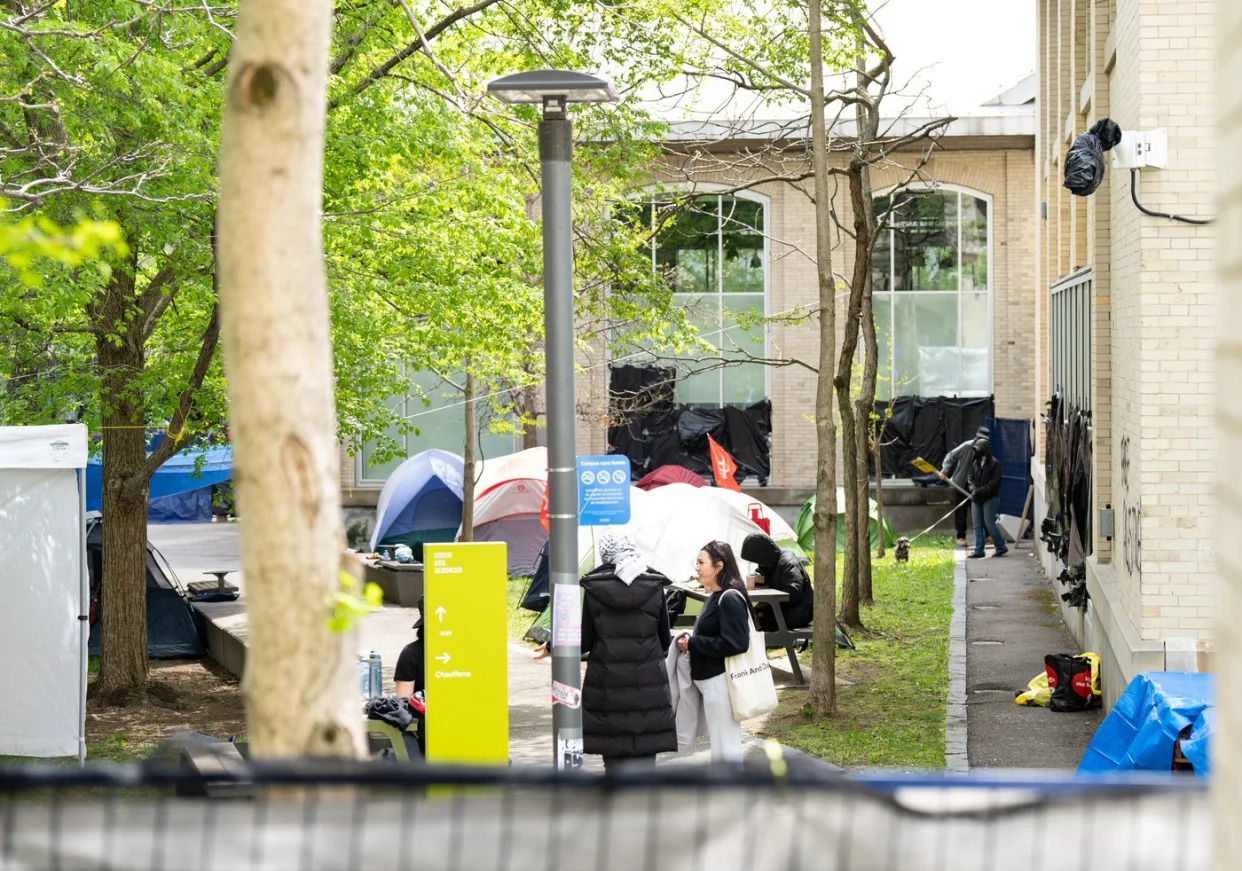
MONTREAL — Université du Québec à Montréal has filed for an injunction against pro-Palestinian protesters who set up an encampment on its downtown campus a little over a week ago.
UQAM is asking the Quebec Superior Court to prohibit protesters from setting up tents and other material within three metres of campus buildings.
It also wants protesters stop allegedly obstructing access to its campus, damaging surveillance cameras, engaging in vandalism and destroying university property.
UQAM says protesters are posing a safety risk by blocking an emergency exit, being in possession of gasoline canisters and iron bars, and potentially "overloading" the university's electrical network with unauthorized extension cords.
Since the encampment started on May 12, protesters have demanded that the university cut ties with Israeli institutions and disclose its links to Israel, and that the Quebec government cancel plans for a diplomatic office in the country.
The university's court application says the inner courtyard of its science centre is being occupied by about 40 tents.
This report by The Canadian Press was first published May 23, 2024.
The Canadian Press
Sun, May 26, 2024
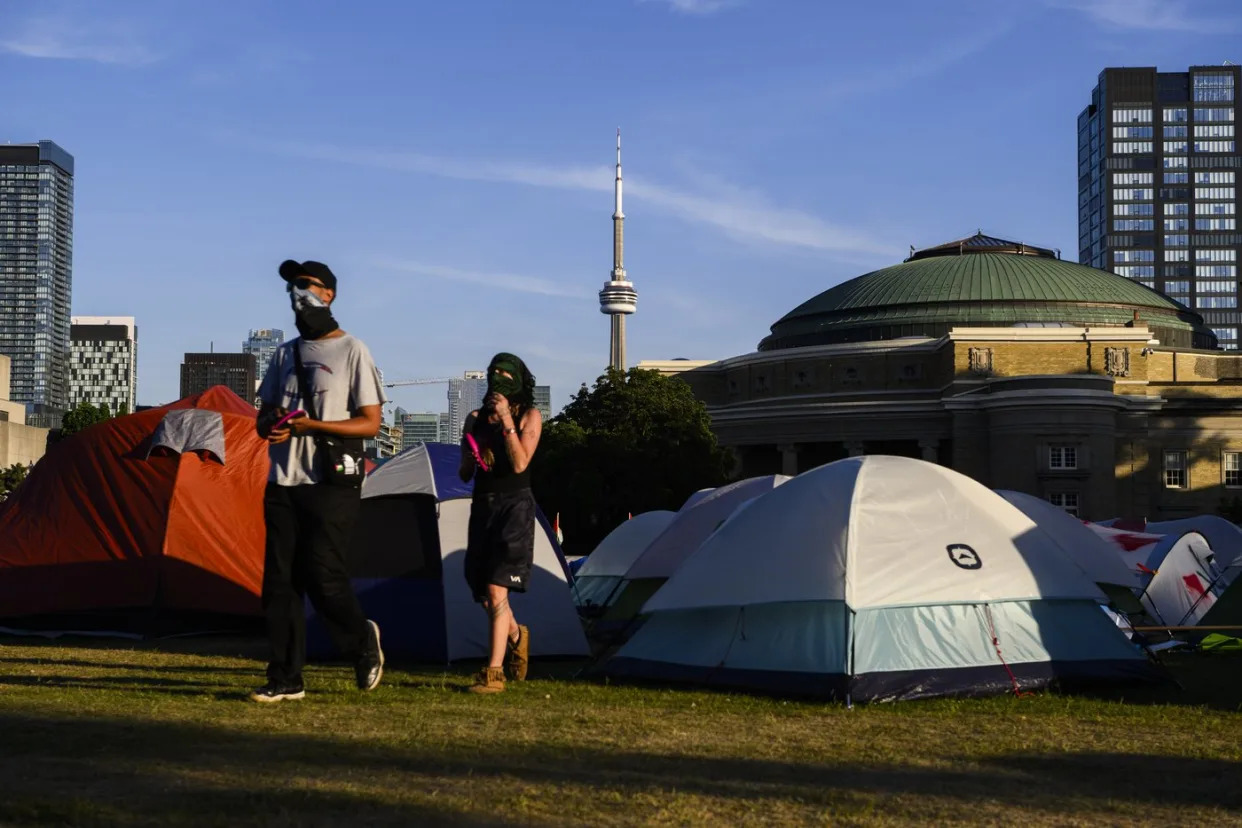
TORONTO — Pro-Palestinian protesters who have set up an encampment on the University of Toronto campus are expected to meet with school officials today.
The meeting, which is scheduled for 5 p.m. local time, comes after the university issued a trespass notice to the protesters on Friday.
The school has said it will take "all necessary legal steps" if the protesters don't clear out by Monday at 8 a.m.
The notice threatens to seek a court order against the camp.
The encampment was set up on May 2 at the heart of the university's downtown campus, part of a massive wave of pro-Palestinian demonstrations at post-secondary institutions in Canada and the United States.
Organizers called on the university to cut its ties with Israel, divest from companies profiting from Israel's offensive in Gaza, and terminate partnerships with the country's academic institutions deemed complicit in the war.
The school made an offer to the protesters on Thursday, which organizers say doesn't meaningfully address their demands.
Organizers say the university's offer was presented to them at the same time President Meric Gertler held a hastily arranged press conference Thursday publicizing its terms and imposing a Friday deadline to accept.
The university's offer said it would form a working group to consider options for the disclosure of the school's investments, but it would not end any partnerships with Israeli universities.
On divestment, the university said it would strike an advisory committee to review the students' request under existing school policies.
This report by The Canadian Press was first published May 26, 2024.

TORONTO — Pro-Palestinian protesters who have set up an encampment on the University of Toronto campus are expected to meet with school officials today.
The meeting, which is scheduled for 5 p.m. local time, comes after the university issued a trespass notice to the protesters on Friday.
The school has said it will take "all necessary legal steps" if the protesters don't clear out by Monday at 8 a.m.
The notice threatens to seek a court order against the camp.
The encampment was set up on May 2 at the heart of the university's downtown campus, part of a massive wave of pro-Palestinian demonstrations at post-secondary institutions in Canada and the United States.
Organizers called on the university to cut its ties with Israel, divest from companies profiting from Israel's offensive in Gaza, and terminate partnerships with the country's academic institutions deemed complicit in the war.
The school made an offer to the protesters on Thursday, which organizers say doesn't meaningfully address their demands.
Organizers say the university's offer was presented to them at the same time President Meric Gertler held a hastily arranged press conference Thursday publicizing its terms and imposing a Friday deadline to accept.
The university's offer said it would form a working group to consider options for the disclosure of the school's investments, but it would not end any partnerships with Israeli universities.
On divestment, the university said it would strike an advisory committee to review the students' request under existing school policies.
This report by The Canadian Press was first published May 26, 2024.
The Canadian Press
Fri, May 24,2024
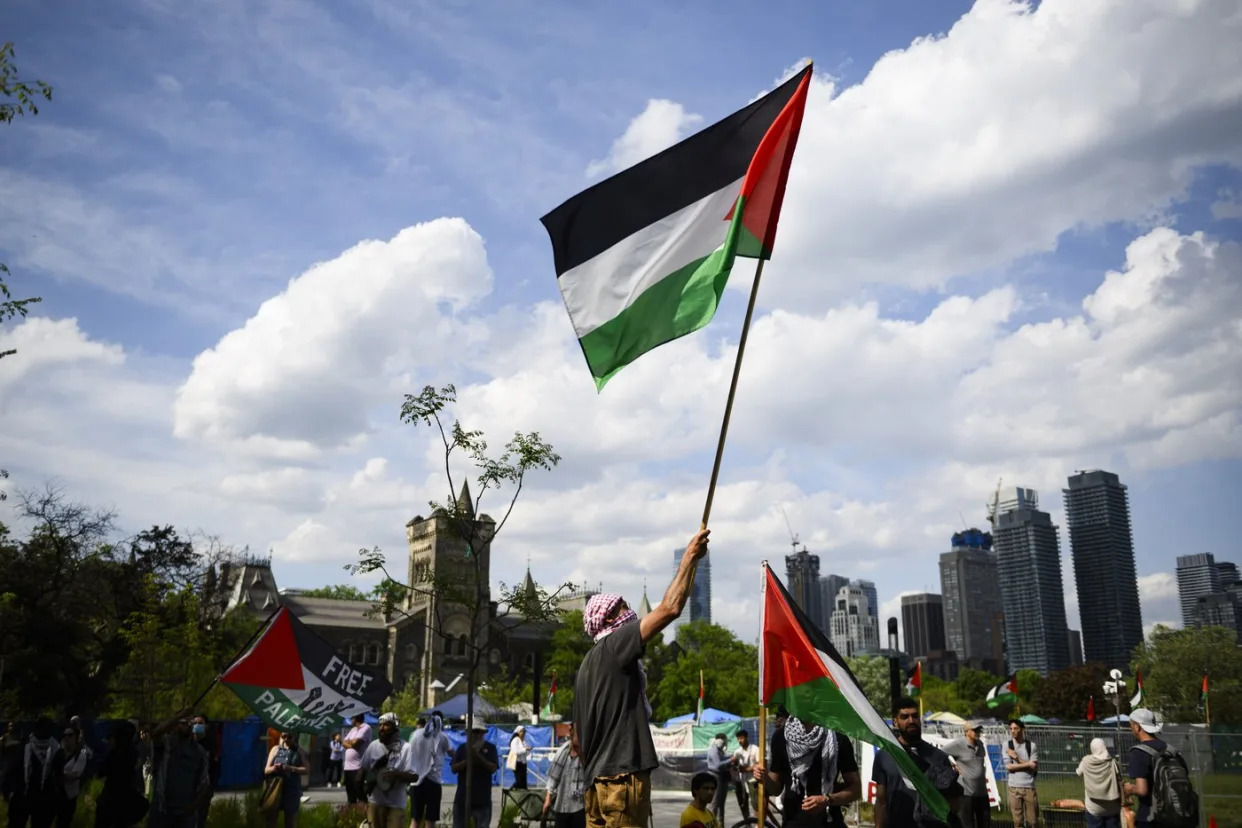
TORONTO — The University of Toronto issued a trespass notice Friday to a pro-Palestinian encampment on campus, vowing to take "all necessary legal steps" if protesters did not clear out by Monday morning.
Despite the notice, encampment organizers said university administrators had also agreed to meet on Sunday at 5 p.m. for continued negotiations.
"There's lots of room between now and then. And we implore the administration to do the right thing, to be on the right side of history," said Erin Mackey, a spokesperson for the encampment.
"We'll continue to be here, and we'll continue to demand divestment."
The notice comes after the university made an offer Thursday, with a 24-hour deadline, to end the weeks-long protest. Organizers called the offer an "ultimatum" with little meaningful response to their demands.
The trespass notice, meanwhile, calls Thursday's offer "full and fair" and gives a deadline of Monday at 8 a.m. for protesters to leave. It threatens to seek a court order against the camp and warns protest participants may be subject to disciplinary action, up to an expulsion recommendation for students and termination for faculty and staff.
"The encampment has created an environment on campus that is contrary to the university’s commitment to fostering a welcoming and safe community for all members to partake of and express themselves freely," the notice said.
The encampment was set up on May 2 at the heart of the university's downtown campus, part of a massive wave of pro-Palestinian demonstrations at post-secondary institutions in Canada and the United States. Organizers called on the university to cut its ties with Israel, divest from companies profiting from Israel's offensive in Gaza, and terminate partnerships with the country's academic institutions deemed complicit in the war.
Organizers say the university's offer was presented to them at the same time president Meric Gertler held a hastily arranged press conference Thursday publicizing its terms and imposing a Friday deadline to accept.
The university's offer said it would form a working group to consider options for the disclosure of the school's investments, but it would not end any partnerships with Israeli universities.
On divestment, the university said it would strike an advisory committee to review the students' request under existing school policies.
The committee would be tasked with presenting its findings by the end of October. The president would then make a decision "in a timely manner," the offer said. Students could "suggest" advisers, but final approval would be with the university's executive committee, on the president's recommendation.
At a news conference earlier Friday, Mackey said the students want "upfront commitments" on divestments and disclosure, not "vague committees" to study the matter. She noted that in 2016 Gertler turned down an advisory committee's recommendation for the school to divest from fossil fuel holdings, only to reverse course years later.
"In this current moment, it is up to the administration, whether they are willing to be serious to engage in a genuine conversation about commitments towards divestment or they're going to continue to give us big committees that ultimately will lead us nowhere," said Mackey.
Sara Rasikh, a master’s student and another spokesperson for the encampment, said organizers are preparing a counteroffer to present to the university at Sunday's meeting.
"We are hoping that they will be receptive to this, to actually listen to their students," she said.
Rasikh said protesters hope the university will not call in the police to clear the camp.
Earlier this month, police officers forcibly removed a group of demonstrators from an encampment set up on the University of Calgary campus.
Pro-Palestinian protesters remain encamped on other campuses in the country, including at McGill University in Montreal and several universities in British Columbia.
In B.C., tents first went up on a field at the University of British Columbia in Vancouver on April 29. Since then, similar encampments have emerged at the University of Victoria and Vancouver Island University in Nanaimo.
In an update on Thursday, the University of Victoria called the protesters’ demands “complex” while promising to support “peaceful expression” and faculty members’ academic freedom to engage both Israeli and Palestinian academics.
UBC president Benoit-Antoine Bacon said last week that the school must remain neutral on the conflict in Gaza in response to demands from encampment organizers.
— With files from Sonja Puzic in Toronto and Chuck Chiang in Vancouver
This report by The Canadian Press was first published May 24, 2024.
Jordan Omstead and Rianna Lim, The Canadian Press
U of T encampment rejects school's offer
CBC
Fri, May 24, 2024
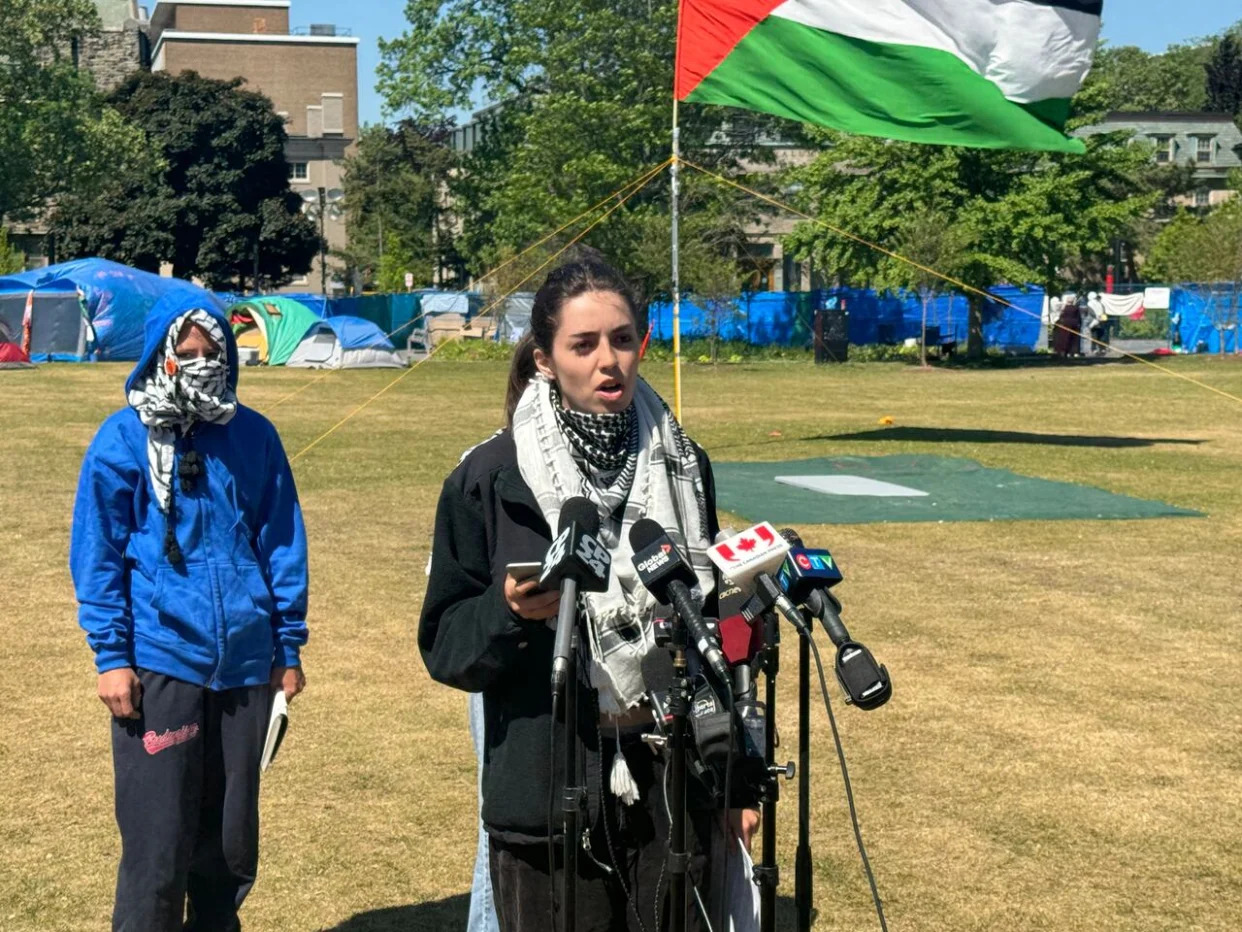
Kalliopé Anvar McCall, a fourth-year U of T student in diaspora studies, speaks at a news conference at the King’s College Circle encampment on Friday, May 24, 2024. She called the school’s negotiations ‘a joke.’ (Chris Glover/CBC - image credit)
A pro-Palestinian encampment at the University of Toronto said the school's latest offer, made in a bid to end an ongoing demonstration on campus, is "an ultimatum."
"This is a joke of a negotiation," encampment organizer Kalliopé Anvar McCall, a fourth-year U of T student in diaspora studies, said at a news conference at the King's College Circle encampment Friday morning.
Organizers criticized the university for its negotiation tactics — particularly, speaking to media outlets, including CBC Radio's Metro Morning, rather than directly with U of T Occupy for Palestine.
The university says it plans to issue a trespass notice if protesters are not gone by 4 p.m. Friday.
"It's not 4 p.m. yet," said student Erin Mackey, a spokesperson for U of T Occupy for Palestine, at the news conference. "We are still trying to figure out what our next steps are."
She also said: "We will continue to be here."
Mackey spoke with Metro Morning earlier on Friday, shortly after the university president did.
"They brought forward a proposal for commitments but commitments aren't good enough," Mackey said.
She is among dozens of students, staff and faculty who have been occupying a green space at King's College Circle on the university's St. George Campus in downtown Toronto since May 2. They've set up tents and canopies in solidarity with other encampments at universities throughout North America, calling for an end to the war between Israel and Hamas in Gaza.
'Problematic' to even negotiate: Jewish group
Hillel Ontario, a group that advocates on behalf of Jewish students, raised concerns when the protest first began about demonstrators chanting, "All the Zionists are racists" and chalk on the ground reading "Go back to Europe."
"The university has an obligation to make sure its campus is safe for all students," said Jay Solomon, Hillel Ontario's chief advancement officer.
"Students are feeling uncomfortable, they're feeling unsafe and they're looking for the university to take some action," he said from nearby the encampment on Friday. "The fact that the university is even negotiating with this group is problematic."
U of T's offer
In its Thursday offer, the university said it would not end partnerships with Israeli universities. It said students would be invited to attend the university's business board of governing council's meeting on June 19 to present their demands, as well as a working group to consider options for disclosure and increased transparency of investments.
If the encampment doesn't accept the offer within 24 hours, the university will issue a trespass notice, U of T president Meric Gertler said Thursday afternoon.
LISTEN | U of T president speaks on Metro Morning:
Gertler reiterated his points Friday morning on Metro Morning.
"I hope … that they will see what we're putting on the table here is a very fair and considered offer," he said.
Gertler said "nothing is more fundamental in many ways to our society" than the right to protest, but also that "we have to balance some other rights, particularly rights of inclusion."
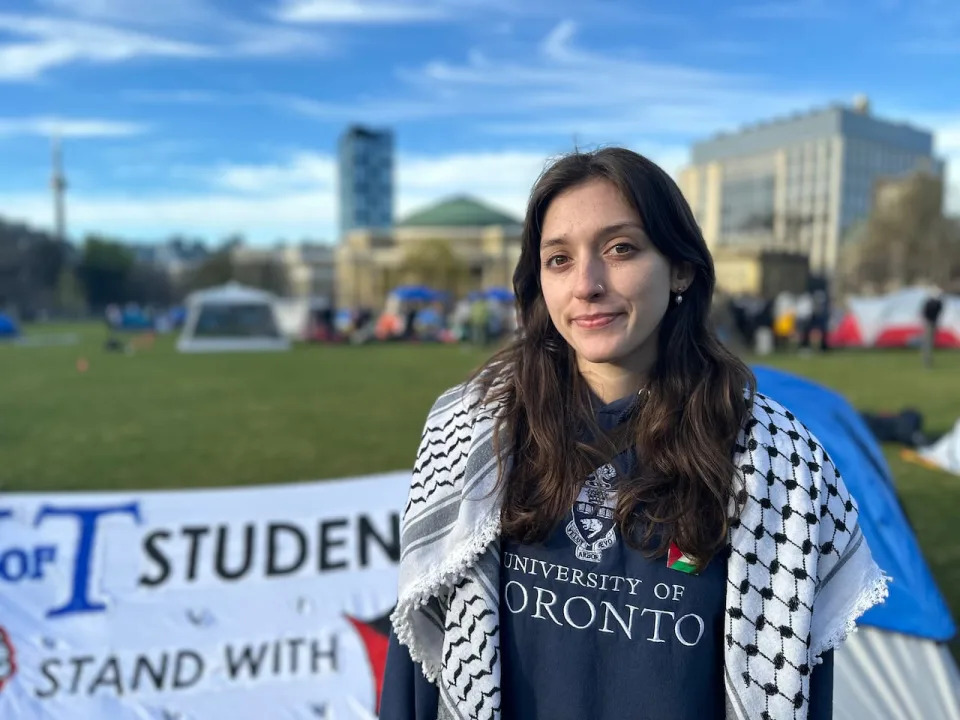
Erin Mackey, a University of Toronto student participating in the protest.
Erin Mackey, a University of Toronto student participating in the protest, is pictured on May 2, 2024. On Friday, she told CBC Radio: 'If they want to clear this encampment, they can meet our demands.' (Meagan Fitzpatrick/CBC)
As of Thursday, Gertler said the university has received 38 reports of harassment, discrimination and "hateful speech and hateful actions" as a result of the encampment.
"The tension that has been generated by the continued presence of the encampment has reached a point where we feel now is the time to end the encampment," he said.
Mackey, meanwhile, said if the university wants to clear the encampment, officials can meet protesters' demands.
"The fact that U of T is willing to call the Toronto police on this encampment — or threaten so, in this current moment — says a lot about where they're at, that they are unwilling to stop funding a genocide, stop investing in bombs and instead call police on their own students."
Speaking on Metro Morning, Gertler said the university is "doing our level best to avoid police involvement."
CBC
Fri, May 24, 2024

Kalliopé Anvar McCall, a fourth-year U of T student in diaspora studies, speaks at a news conference at the King’s College Circle encampment on Friday, May 24, 2024. She called the school’s negotiations ‘a joke.’ (Chris Glover/CBC - image credit)
A pro-Palestinian encampment at the University of Toronto said the school's latest offer, made in a bid to end an ongoing demonstration on campus, is "an ultimatum."
"This is a joke of a negotiation," encampment organizer Kalliopé Anvar McCall, a fourth-year U of T student in diaspora studies, said at a news conference at the King's College Circle encampment Friday morning.
Organizers criticized the university for its negotiation tactics — particularly, speaking to media outlets, including CBC Radio's Metro Morning, rather than directly with U of T Occupy for Palestine.
The university says it plans to issue a trespass notice if protesters are not gone by 4 p.m. Friday.
"It's not 4 p.m. yet," said student Erin Mackey, a spokesperson for U of T Occupy for Palestine, at the news conference. "We are still trying to figure out what our next steps are."
She also said: "We will continue to be here."
Mackey spoke with Metro Morning earlier on Friday, shortly after the university president did.
"They brought forward a proposal for commitments but commitments aren't good enough," Mackey said.
She is among dozens of students, staff and faculty who have been occupying a green space at King's College Circle on the university's St. George Campus in downtown Toronto since May 2. They've set up tents and canopies in solidarity with other encampments at universities throughout North America, calling for an end to the war between Israel and Hamas in Gaza.
'Problematic' to even negotiate: Jewish group
Hillel Ontario, a group that advocates on behalf of Jewish students, raised concerns when the protest first began about demonstrators chanting, "All the Zionists are racists" and chalk on the ground reading "Go back to Europe."
"The university has an obligation to make sure its campus is safe for all students," said Jay Solomon, Hillel Ontario's chief advancement officer.
"Students are feeling uncomfortable, they're feeling unsafe and they're looking for the university to take some action," he said from nearby the encampment on Friday. "The fact that the university is even negotiating with this group is problematic."
U of T's offer
In its Thursday offer, the university said it would not end partnerships with Israeli universities. It said students would be invited to attend the university's business board of governing council's meeting on June 19 to present their demands, as well as a working group to consider options for disclosure and increased transparency of investments.
If the encampment doesn't accept the offer within 24 hours, the university will issue a trespass notice, U of T president Meric Gertler said Thursday afternoon.
LISTEN | U of T president speaks on Metro Morning:
Gertler reiterated his points Friday morning on Metro Morning.
"I hope … that they will see what we're putting on the table here is a very fair and considered offer," he said.
Gertler said "nothing is more fundamental in many ways to our society" than the right to protest, but also that "we have to balance some other rights, particularly rights of inclusion."

Erin Mackey, a University of Toronto student participating in the protest.
Erin Mackey, a University of Toronto student participating in the protest, is pictured on May 2, 2024. On Friday, she told CBC Radio: 'If they want to clear this encampment, they can meet our demands.' (Meagan Fitzpatrick/CBC)
As of Thursday, Gertler said the university has received 38 reports of harassment, discrimination and "hateful speech and hateful actions" as a result of the encampment.
"The tension that has been generated by the continued presence of the encampment has reached a point where we feel now is the time to end the encampment," he said.
Mackey, meanwhile, said if the university wants to clear the encampment, officials can meet protesters' demands.
"The fact that U of T is willing to call the Toronto police on this encampment — or threaten so, in this current moment — says a lot about where they're at, that they are unwilling to stop funding a genocide, stop investing in bombs and instead call police on their own students."
Speaking on Metro Morning, Gertler said the university is "doing our level best to avoid police involvement."
Queen's encampment packing up as protesters declare small victory in ongoing battle
Local Journalism Initiative
Fri, May 24, 2024
Editorial note: The views and accounts quoted by those protesting at the encampment on Queen's University do not necessarily reflect those of Kingstonist and have not been independently verified.
“Children needlessly slaughtered, their potential stolen. An afterthought at best in a campaign of indiscriminate violence and continued genocide against the Palestinian people: tragic, unimaginable, but heartbreakingly common." This is how one protester at Queen’s framed her reasons for participating in a 12-day encampment at Queen’s University this month.
That encampment will be packed up by the end of the day today, Wednesday, May 22, 2024, the protest leaders --- Queen’s University Apartheid Divest (QUAD) --- explained at a noon-hour press conference. And though they don’t consider the end of their occupation of the “liberated zone” in a quad behind Richardson and Dunning Halls to be a victory, they do say it is one positive step on what they suggest is a long journey of negotiations with the university.
According to speakers from QUAD, the “liberated zone” encampment was initially planned for one night on Friday, May 10, 2024. The original intention was to disrupt the Board of Trustees meeting on May 10 and 11. QUAD submitted a report to the principal and the Board of Trustees on Thursday, May 9, asking to be added to the board's open session agenda. At that time, they submitted a 30-page report detailing divestment recommendations and indicating that $150 million of Queen’s endowment funds are invested in companies “that facilitate the violence and Israeli occupation of Palestinian territories.”
As part of the Palestinian liberation movement, QUAD demanded that Queen's divest from “all companies and institutions that have upheld and continue to uphold the 76 years of Israeli settler colonial occupation, apartheid, and violence.”
The group, who define themselves on social media as “a coalition of students, organizations, and faculty united by the belief that the struggle for Palestinian liberation is intrinsic to our collective pursuit of justice,” aims to uphold the legacy of the 1987 Queen’s University South African anti-apartheid movement and the outspoken alumni who succeeded in persuading Queen’s to divest at least partially from South African companies and holdings.
QUAD called the encampment “an escalation tactic” to pressure Queen's to eliminate its $150 million in problematic investments. And while they could not present the report in the open session, the board chair agreed to meet with student representatives from QUAD along with the principal and incoming board chair, according to the protesters.
QUAD stated that their demands had been addressed and discussed in meetings of their negotiation team with Queen’s administration and that “[Principal] Patrick Deane has since accepted our formal request for divestment, and [he has promised to] commence the committee on divestment within one week's time.”
Throughout negotiations, QUAD representatives stated, “We actively and consistently reminded them how every 10 minutes another child in Gaza is killed. That every day another child in Gaza gets amputated. That every university in Gaza has been destroyed. We reminded senior administration that they are active contributors of this scholasticide and genocide. Queen's cannot be platformed as third in the world for its sustainable development goals while investing in the war machine and profiting from Palestinian blood.”
“We have been told that the committee chair will be announced by the end of this week," they shared, "We have requested two seats on this committee. We have also requested that a committee timeline and selection criteria be provided for transparency and measure of good faith.”
The speakers were proud that the students, faculty, and community of QUAD “and our pressure through this encampment” had brought about the formation of the divestment committee. Still, they said they were under no Illusions: “We do not believe the future meetings and future policy promises are divestment victory. These delays are meant to pacify us. But let it be clear that we will remain persistent towards our goals for full divestment, full disclosure, a full academic boycott in a fully liberated Palestine.”
Regarding the other demands, the group shared that Vice-Principal (Culture, Equity, and Inclusion) Stephanie Simpson has stated they will look into and provide more information on implementing a definition of anti-Palestinian racism, “specifically implementing it through training for staff, faculty, and administration."
They also shared that Vice-Provost Sandra den Otter had informed them that “there is no precedent of academic boycott in Queen's history." In response, they said, “we take this as a commitment to be the first to ensure Queen's severs ties from institutions that facilitate these war crimes.”
“We also demanded that Queen’s take restorative action to rebuild and reinvest in Palestinian academia through the establishment of partnerships with Palestinian universities, and this is something we will continue to pressure the administration to commit to,” they stated.
Finally, they noted that as a precondition to decamping, “we have received confirmation via email from the provost that there will be no retaliation from the Queen's administration for all protesters and campers.”
However, they made sure to add, “we also want to highlight shameful acts of cowardice and hypocrisy from university leadership when framing the genocide in Palestine and our actions here in this encampment. On day three of our encampment, our principal, Patrick Deane, released a statement in which [the university] continued to use generalized language such as ‘the Middle East conflict,’ continuing to shamefully erase Palestine. He also referred to our actions in the protest as violent and aggressive, when the real threat came from Campus Security and calling police onto our campus.”
The group said they will be releasing more information about “these inexcusable acts of violence” in the coming days. When pressed, they gave details of one specific incident captured on video in which they said Campus Security officers brutally beat and kicked protestors.
“Queen's administration has largely not responded to any of the reports or dozens of concerns relating to surveillance, harassment, and violence perpetrated by Zionists on our campus over the past eight months. We are mindful of naming victories and aim to be transparent about our struggle.”
“In the past twelve days, senior administration has addressed all six of our demands but has used bureaucratic processes to evade accountability for their complicity in the Palestinian genocide,” they declared. “Queen's, your hands are red, and we will remind you of this until you take direct and meaningful action to materially meet these demands and fully divest from the Zionist regime.”
This is a developing story with more details to come.
Michelle Dorey Forestell, Local Journalism Initiative Reporter, Kingstonist.com
Pro-Palestinian protesters at Queen's pack up as university reviews divestment request
CBC
Wed, May 22, 2024
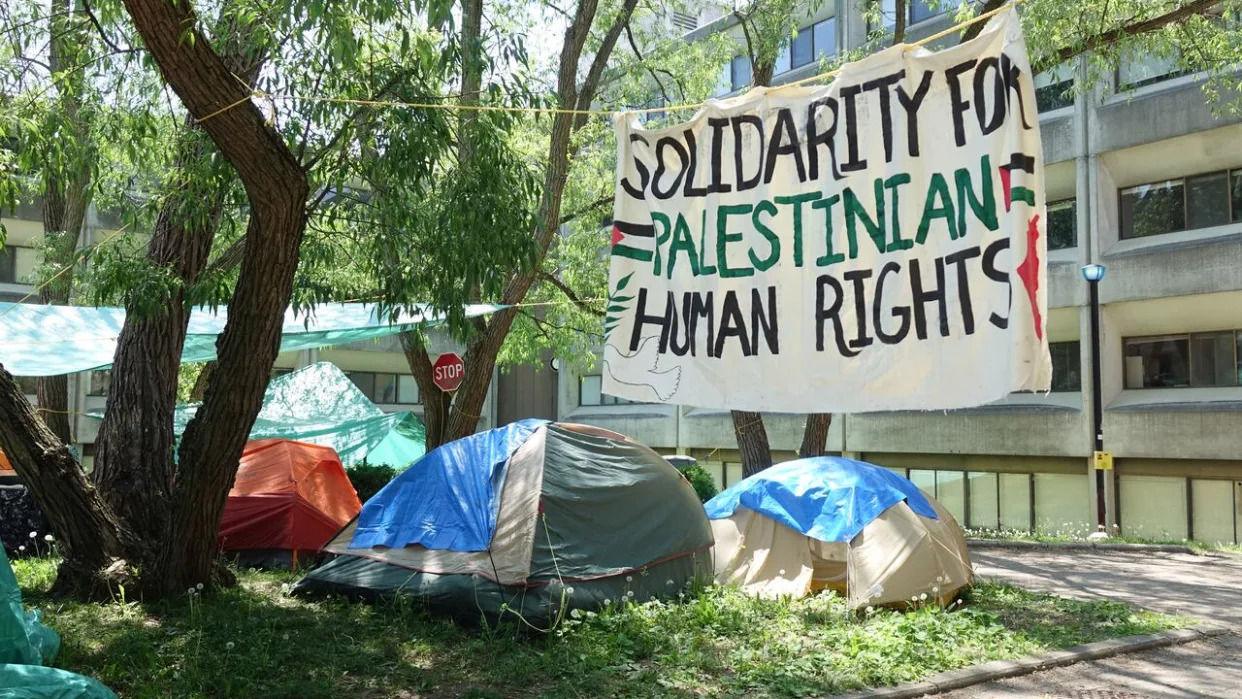
Pro-Palestinian protesters at Queen's University in Kingston, Ont., say while they plan to pack up their encampment, they'll continue pushing for their demands to be met.
Local Journalism Initiative
Fri, May 24, 2024
Editorial note: The views and accounts quoted by those protesting at the encampment on Queen's University do not necessarily reflect those of Kingstonist and have not been independently verified.
“Children needlessly slaughtered, their potential stolen. An afterthought at best in a campaign of indiscriminate violence and continued genocide against the Palestinian people: tragic, unimaginable, but heartbreakingly common." This is how one protester at Queen’s framed her reasons for participating in a 12-day encampment at Queen’s University this month.
That encampment will be packed up by the end of the day today, Wednesday, May 22, 2024, the protest leaders --- Queen’s University Apartheid Divest (QUAD) --- explained at a noon-hour press conference. And though they don’t consider the end of their occupation of the “liberated zone” in a quad behind Richardson and Dunning Halls to be a victory, they do say it is one positive step on what they suggest is a long journey of negotiations with the university.
According to speakers from QUAD, the “liberated zone” encampment was initially planned for one night on Friday, May 10, 2024. The original intention was to disrupt the Board of Trustees meeting on May 10 and 11. QUAD submitted a report to the principal and the Board of Trustees on Thursday, May 9, asking to be added to the board's open session agenda. At that time, they submitted a 30-page report detailing divestment recommendations and indicating that $150 million of Queen’s endowment funds are invested in companies “that facilitate the violence and Israeli occupation of Palestinian territories.”
As part of the Palestinian liberation movement, QUAD demanded that Queen's divest from “all companies and institutions that have upheld and continue to uphold the 76 years of Israeli settler colonial occupation, apartheid, and violence.”
The group, who define themselves on social media as “a coalition of students, organizations, and faculty united by the belief that the struggle for Palestinian liberation is intrinsic to our collective pursuit of justice,” aims to uphold the legacy of the 1987 Queen’s University South African anti-apartheid movement and the outspoken alumni who succeeded in persuading Queen’s to divest at least partially from South African companies and holdings.
QUAD called the encampment “an escalation tactic” to pressure Queen's to eliminate its $150 million in problematic investments. And while they could not present the report in the open session, the board chair agreed to meet with student representatives from QUAD along with the principal and incoming board chair, according to the protesters.
QUAD stated that their demands had been addressed and discussed in meetings of their negotiation team with Queen’s administration and that “[Principal] Patrick Deane has since accepted our formal request for divestment, and [he has promised to] commence the committee on divestment within one week's time.”
Throughout negotiations, QUAD representatives stated, “We actively and consistently reminded them how every 10 minutes another child in Gaza is killed. That every day another child in Gaza gets amputated. That every university in Gaza has been destroyed. We reminded senior administration that they are active contributors of this scholasticide and genocide. Queen's cannot be platformed as third in the world for its sustainable development goals while investing in the war machine and profiting from Palestinian blood.”
“We have been told that the committee chair will be announced by the end of this week," they shared, "We have requested two seats on this committee. We have also requested that a committee timeline and selection criteria be provided for transparency and measure of good faith.”
The speakers were proud that the students, faculty, and community of QUAD “and our pressure through this encampment” had brought about the formation of the divestment committee. Still, they said they were under no Illusions: “We do not believe the future meetings and future policy promises are divestment victory. These delays are meant to pacify us. But let it be clear that we will remain persistent towards our goals for full divestment, full disclosure, a full academic boycott in a fully liberated Palestine.”
Regarding the other demands, the group shared that Vice-Principal (Culture, Equity, and Inclusion) Stephanie Simpson has stated they will look into and provide more information on implementing a definition of anti-Palestinian racism, “specifically implementing it through training for staff, faculty, and administration."
They also shared that Vice-Provost Sandra den Otter had informed them that “there is no precedent of academic boycott in Queen's history." In response, they said, “we take this as a commitment to be the first to ensure Queen's severs ties from institutions that facilitate these war crimes.”
“We also demanded that Queen’s take restorative action to rebuild and reinvest in Palestinian academia through the establishment of partnerships with Palestinian universities, and this is something we will continue to pressure the administration to commit to,” they stated.
Finally, they noted that as a precondition to decamping, “we have received confirmation via email from the provost that there will be no retaliation from the Queen's administration for all protesters and campers.”
However, they made sure to add, “we also want to highlight shameful acts of cowardice and hypocrisy from university leadership when framing the genocide in Palestine and our actions here in this encampment. On day three of our encampment, our principal, Patrick Deane, released a statement in which [the university] continued to use generalized language such as ‘the Middle East conflict,’ continuing to shamefully erase Palestine. He also referred to our actions in the protest as violent and aggressive, when the real threat came from Campus Security and calling police onto our campus.”
The group said they will be releasing more information about “these inexcusable acts of violence” in the coming days. When pressed, they gave details of one specific incident captured on video in which they said Campus Security officers brutally beat and kicked protestors.
“Queen's administration has largely not responded to any of the reports or dozens of concerns relating to surveillance, harassment, and violence perpetrated by Zionists on our campus over the past eight months. We are mindful of naming victories and aim to be transparent about our struggle.”
“In the past twelve days, senior administration has addressed all six of our demands but has used bureaucratic processes to evade accountability for their complicity in the Palestinian genocide,” they declared. “Queen's, your hands are red, and we will remind you of this until you take direct and meaningful action to materially meet these demands and fully divest from the Zionist regime.”
This is a developing story with more details to come.
Michelle Dorey Forestell, Local Journalism Initiative Reporter, Kingstonist.com
Pro-Palestinian protesters at Queen's pack up as university reviews divestment request
CBC
Wed, May 22, 2024

Pro-Palestinian protesters at Queen's University in Kingston, Ont., say while they plan to pack up their encampment, they'll continue pushing for their demands to be met.
(Dan Taekema/CBC - image credit)
Pro-Palestinian protesters are packing up after 12 nights camped outside an administration building at Queen's University in Kingston, Ont.
The encampment grew out of an all-day demonstration on May 10, with more than a dozen tents sprawling across the grass outside Richardson Hall.
Posters, blood-red hand prints and chalk messages declaring the protesters' six demands, including divestment from companies with ties to Israel, quickly covered the walls of the courtyard.
On Wednesday, encampment organizers called a media conference and announced they're leaving.
"By this evening, we will be taking down ... our tents," said Yara Hussein, a fifth-year Queen's student.
While the encampment may be gone, the protesters plan to keep pressuring the university to meet their demands, she added.
"We will continue to organize and mobilize on this campus," Hussein said. "We pitched a tent in a night and we can pitch more."
Encampment organizers said Queen's principal Patrick Deane has received their formal request for divestment, along with around 600 signatures in support of it.
Deane has also agreed to strike a committee to review the request within the week, according to the group, which has requested two seats on it.
University to examine divestment
A statement shared on behalf of the university confirmed it has accepted a request to consider divestment after meeting with protesters over the past 10 days .
According to the statement, Deane is creating a "Review Committee for Responsible Investing," adding its recommendations could include coordinating consultations or arranging delegations.
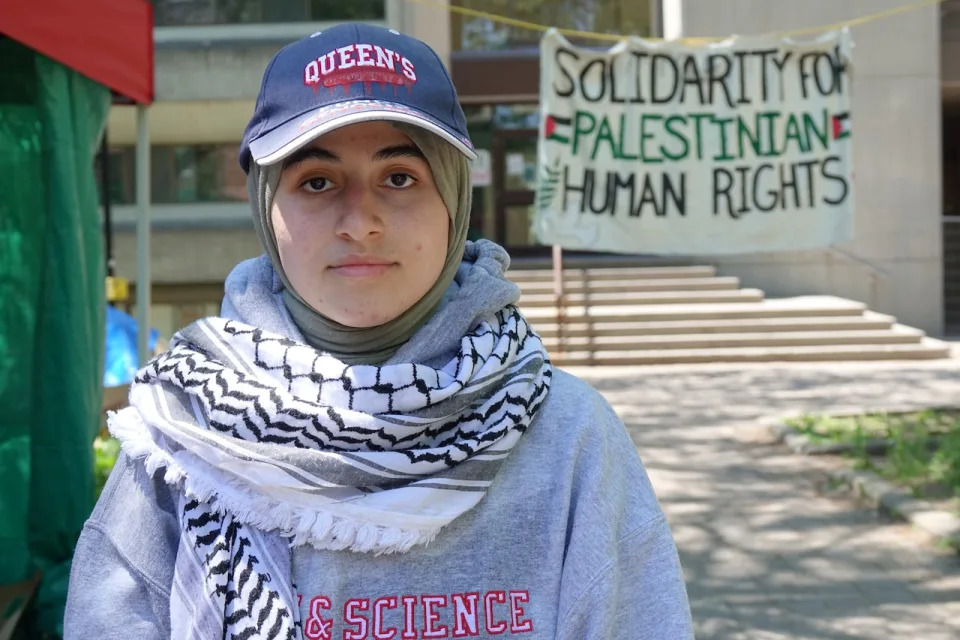
Queen's student Yara Hussein is one of the encampment organizers. She said they'll continue pressuring Queen's to divest from companies with ties to Israel.
Queen's student Yara Hussein is one of the encampment organizers. She said they'll continue pressuring Queen's to divest from companies with ties to Israel. (Dan Taekema/CBC)
Those recommendations will then be provided to the principal for consideration before he hands them over to the Board of Trustees, which will have final approval.
"There will be opportunities for all those who have an interest in this matter to participate in this process," the statement adds.
The tents at Queen's were part of a wave of protests at universities across North America, some of which were forcibly cleared by police.
Protesters plan more 'escalations'
Jake Morrow, another one of the encampment organizers in Kingston, estimated roughly 150 people took part. He said the decision to leave was unanimous.
"By taking this moment to step back, we are allowing ourselves the time to prepare for our next steps, our next escalations so that the university feels the pressure again and again," Morrow said.
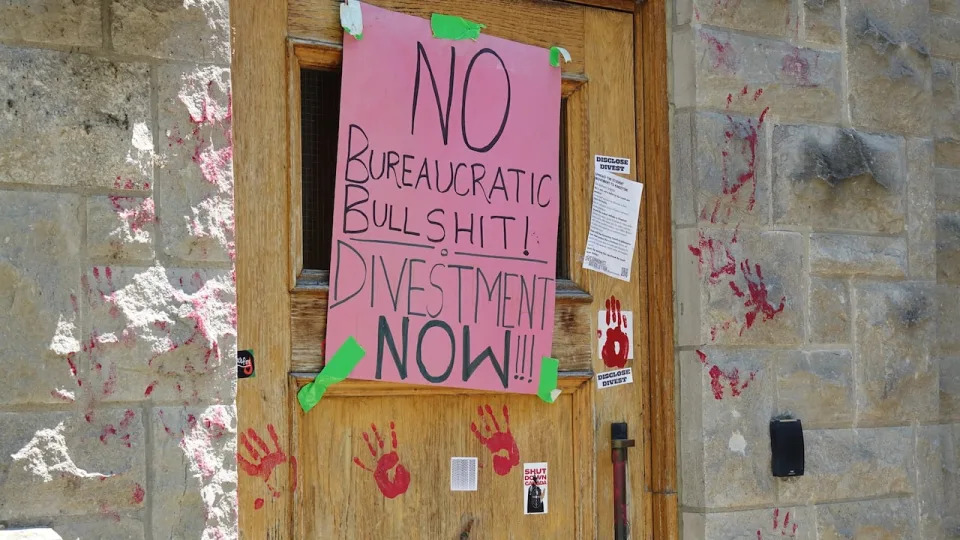
Protesters covered the walls of a courtyard at Queen's University with posters and paint calling for their six demands to be met.
Protesters covered the walls of a courtyard at Queen's University with posters and paint calling for their six demands to be met. (Dan Taekema/CBC)
While Queen's hasn't met all of their demands, which include an academic boycott of Tel Aviv and Ben-Gurion universities, and more disclosure around the university's investments, it has acknowledged them, the protesters said.
They added the university has also committed to ensuring no participants will face retaliation for joining the encampment.
"We don't see these as victories, but rather opportunities to hold this administration and these senior admin as accountable," Hussein said.
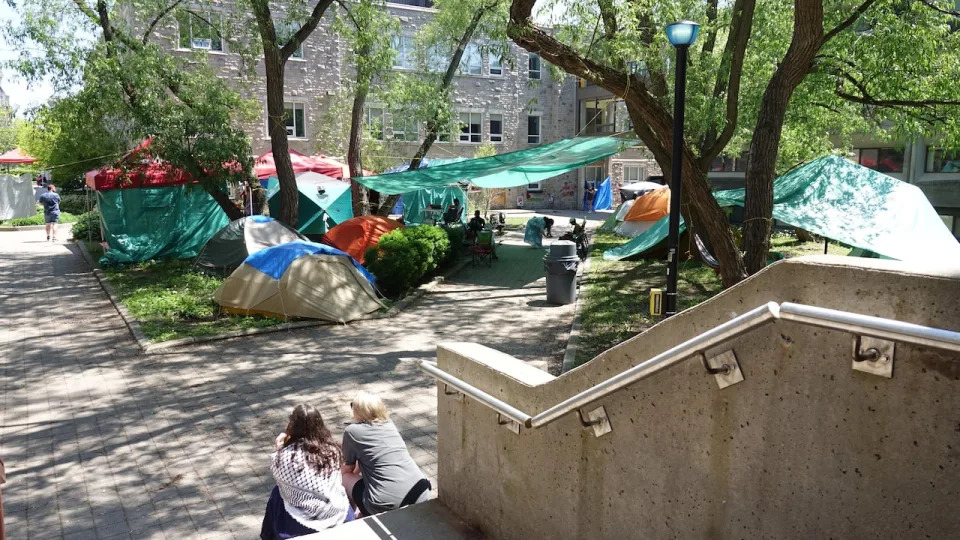
The encampment outside Richardson Hall was in place for twelve nights, starting on May 10, 2024.
The encampment outside Richardson Hall was in place for 12 nights, starting on May 10. (Dan Taekema/CBC)
Pro-Palestinian protesters are packing up after 12 nights camped outside an administration building at Queen's University in Kingston, Ont.
The encampment grew out of an all-day demonstration on May 10, with more than a dozen tents sprawling across the grass outside Richardson Hall.
Posters, blood-red hand prints and chalk messages declaring the protesters' six demands, including divestment from companies with ties to Israel, quickly covered the walls of the courtyard.
On Wednesday, encampment organizers called a media conference and announced they're leaving.
"By this evening, we will be taking down ... our tents," said Yara Hussein, a fifth-year Queen's student.
While the encampment may be gone, the protesters plan to keep pressuring the university to meet their demands, she added.
"We will continue to organize and mobilize on this campus," Hussein said. "We pitched a tent in a night and we can pitch more."
Encampment organizers said Queen's principal Patrick Deane has received their formal request for divestment, along with around 600 signatures in support of it.
Deane has also agreed to strike a committee to review the request within the week, according to the group, which has requested two seats on it.
University to examine divestment
A statement shared on behalf of the university confirmed it has accepted a request to consider divestment after meeting with protesters over the past 10 days .
According to the statement, Deane is creating a "Review Committee for Responsible Investing," adding its recommendations could include coordinating consultations or arranging delegations.

Queen's student Yara Hussein is one of the encampment organizers. She said they'll continue pressuring Queen's to divest from companies with ties to Israel.
Queen's student Yara Hussein is one of the encampment organizers. She said they'll continue pressuring Queen's to divest from companies with ties to Israel. (Dan Taekema/CBC)
Those recommendations will then be provided to the principal for consideration before he hands them over to the Board of Trustees, which will have final approval.
"There will be opportunities for all those who have an interest in this matter to participate in this process," the statement adds.
The tents at Queen's were part of a wave of protests at universities across North America, some of which were forcibly cleared by police.
Protesters plan more 'escalations'
Jake Morrow, another one of the encampment organizers in Kingston, estimated roughly 150 people took part. He said the decision to leave was unanimous.
"By taking this moment to step back, we are allowing ourselves the time to prepare for our next steps, our next escalations so that the university feels the pressure again and again," Morrow said.

Protesters covered the walls of a courtyard at Queen's University with posters and paint calling for their six demands to be met.
Protesters covered the walls of a courtyard at Queen's University with posters and paint calling for their six demands to be met. (Dan Taekema/CBC)
While Queen's hasn't met all of their demands, which include an academic boycott of Tel Aviv and Ben-Gurion universities, and more disclosure around the university's investments, it has acknowledged them, the protesters said.
They added the university has also committed to ensuring no participants will face retaliation for joining the encampment.
"We don't see these as victories, but rather opportunities to hold this administration and these senior admin as accountable," Hussein said.

The encampment outside Richardson Hall was in place for twelve nights, starting on May 10, 2024.
The encampment outside Richardson Hall was in place for 12 nights, starting on May 10. (Dan Taekema/CBC)
University of Waterloo issues formal notice to protesters to end encampment
CBC
Thu, May 23, 2024
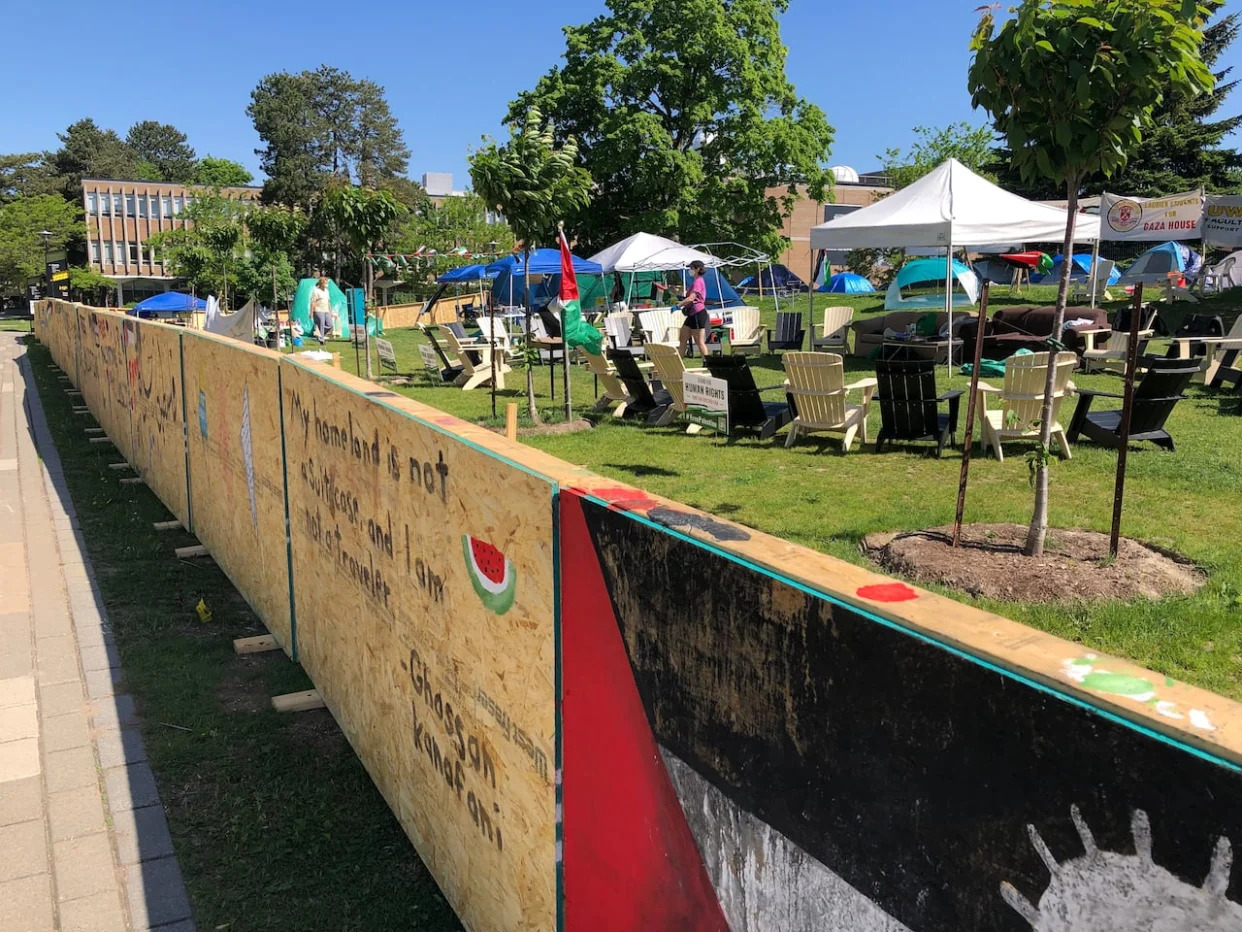
The University of Waterloo has issued a formal notice to protesters to end an encampment set up on May 13. The school says the encampment has violated at least six university policies. (Aastha Shetty/CBC - image credit)
The University of Waterloo has issued a formal notice to people who have set up an encampment on campus to end the protest and remove all structures.
In a letter posted to the school's website on Monday, and taped to light posts near the encampment, the school says the encampment and associated events "violate several items listed on our list of prohibited activities ... and also violate various University of Waterloo policies."
The university says the protesters have contravened six policies, including:
Policy 2 in regards to signage. The school says signs, flags and banners at the encampment have been installed without permission.
Policy 15 which requires permission to use spaces on the university campus outside of regularly scheduled hours.
Policy 22 which says no modifications or attachments to a building or structure can be put up by anyone except university plant operations staff. The university says their tents and a plywood barricade were put up without authorization.
Policy 33 which "unduly interferes with the study, work or working environment of other members of the university or any aspect of another's university activity."
Policy 34 which is a health, safety and environment policy that the school says the group has gone against because they have refused to allow inspections of the encampment's structures.
Policy 74 that covers misuse of university resources, including the unauthorized use of equipment, material or a facility or service.
"We have been clear, including in writing, that the encampment cannot remain indefinitely and that members of the encampment have already breached several of our prohibited activities and policies. Because you continue to violate our policies, we require you to end the encampment immediately and to dismantle all structures," the statement says.
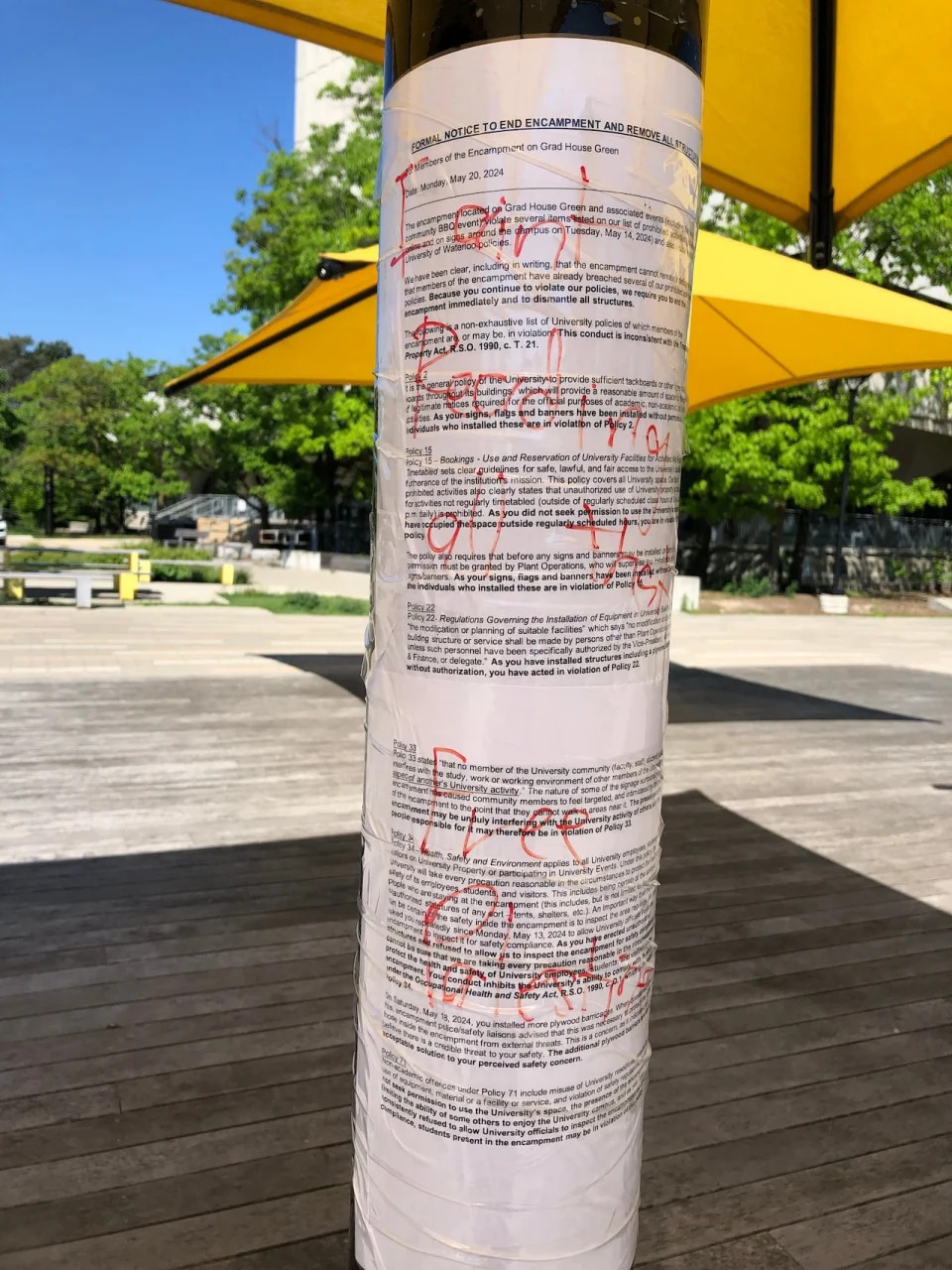
The university has put up its formal notice to end the encampment on light posts and umbrella stands near the area around where the encampment has been set up. (Aastha Shetty/CBC)
'We're not taking their threats very seriously'
Nicholas Joseph, the media liaison for the group Occupy UW, told CBC News Thursday afternoon that there are no plans to dismantle the encampment.
"The university admin has posted and taped heavily this list of supposed violations that we're committing. They also handed a copy to us. It seems very passive aggressive and pretty threatening and we're not taking their threats very seriously," Joseph said.
Joseph alleges the university has not engaged in an open dialogue with the group. Instead, he said the university administration has asked to do safety tours of the encampment and Joseph says the protesters have denied that request.
"Because we've put up flags and stuff like that, they've taped these things, bolding and underlining all of the supposed infractions we're committing," he said.
"It just seems threatening. It just seems they're telling us to dismantle the encampment immediately. We're not going to do that."
He said from the encampment's perspective, the next steps "are quite clear."
"They need to concede to our demands," he said.
The protesters say they decided to set up the encampment because of the growing number of deaths during the on-going Israel-Hamas war.
The group that organized the encampment has previously held rallies on campus and attended a university senate meeting earlier this month to demand the university should boycott and divest from all institutions supporting Israel in the midst of the ongoing war.
A similar encampment went up at the University of Guelph campus on Tuesday of this week. Other encampments have taken place at university campuses across the country, including at McGill University in Montreal, the University of Toronto, McMaster University in Hamilton and University of Windsor.
CBC
Thu, May 23, 2024

The University of Waterloo has issued a formal notice to protesters to end an encampment set up on May 13. The school says the encampment has violated at least six university policies. (Aastha Shetty/CBC - image credit)
The University of Waterloo has issued a formal notice to people who have set up an encampment on campus to end the protest and remove all structures.
In a letter posted to the school's website on Monday, and taped to light posts near the encampment, the school says the encampment and associated events "violate several items listed on our list of prohibited activities ... and also violate various University of Waterloo policies."
The university says the protesters have contravened six policies, including:
Policy 2 in regards to signage. The school says signs, flags and banners at the encampment have been installed without permission.
Policy 15 which requires permission to use spaces on the university campus outside of regularly scheduled hours.
Policy 22 which says no modifications or attachments to a building or structure can be put up by anyone except university plant operations staff. The university says their tents and a plywood barricade were put up without authorization.
Policy 33 which "unduly interferes with the study, work or working environment of other members of the university or any aspect of another's university activity."
Policy 34 which is a health, safety and environment policy that the school says the group has gone against because they have refused to allow inspections of the encampment's structures.
Policy 74 that covers misuse of university resources, including the unauthorized use of equipment, material or a facility or service.
"We have been clear, including in writing, that the encampment cannot remain indefinitely and that members of the encampment have already breached several of our prohibited activities and policies. Because you continue to violate our policies, we require you to end the encampment immediately and to dismantle all structures," the statement says.

The university has put up its formal notice to end the encampment on light posts and umbrella stands near the area around where the encampment has been set up. (Aastha Shetty/CBC)
'We're not taking their threats very seriously'
Nicholas Joseph, the media liaison for the group Occupy UW, told CBC News Thursday afternoon that there are no plans to dismantle the encampment.
"The university admin has posted and taped heavily this list of supposed violations that we're committing. They also handed a copy to us. It seems very passive aggressive and pretty threatening and we're not taking their threats very seriously," Joseph said.
Joseph alleges the university has not engaged in an open dialogue with the group. Instead, he said the university administration has asked to do safety tours of the encampment and Joseph says the protesters have denied that request.
"Because we've put up flags and stuff like that, they've taped these things, bolding and underlining all of the supposed infractions we're committing," he said.
"It just seems threatening. It just seems they're telling us to dismantle the encampment immediately. We're not going to do that."
He said from the encampment's perspective, the next steps "are quite clear."
"They need to concede to our demands," he said.
The protesters say they decided to set up the encampment because of the growing number of deaths during the on-going Israel-Hamas war.
The group that organized the encampment has previously held rallies on campus and attended a university senate meeting earlier this month to demand the university should boycott and divest from all institutions supporting Israel in the midst of the ongoing war.
A similar encampment went up at the University of Guelph campus on Tuesday of this week. Other encampments have taken place at university campuses across the country, including at McGill University in Montreal, the University of Toronto, McMaster University in Hamilton and University of Windsor.
CBC
Thu, May 23, 2024
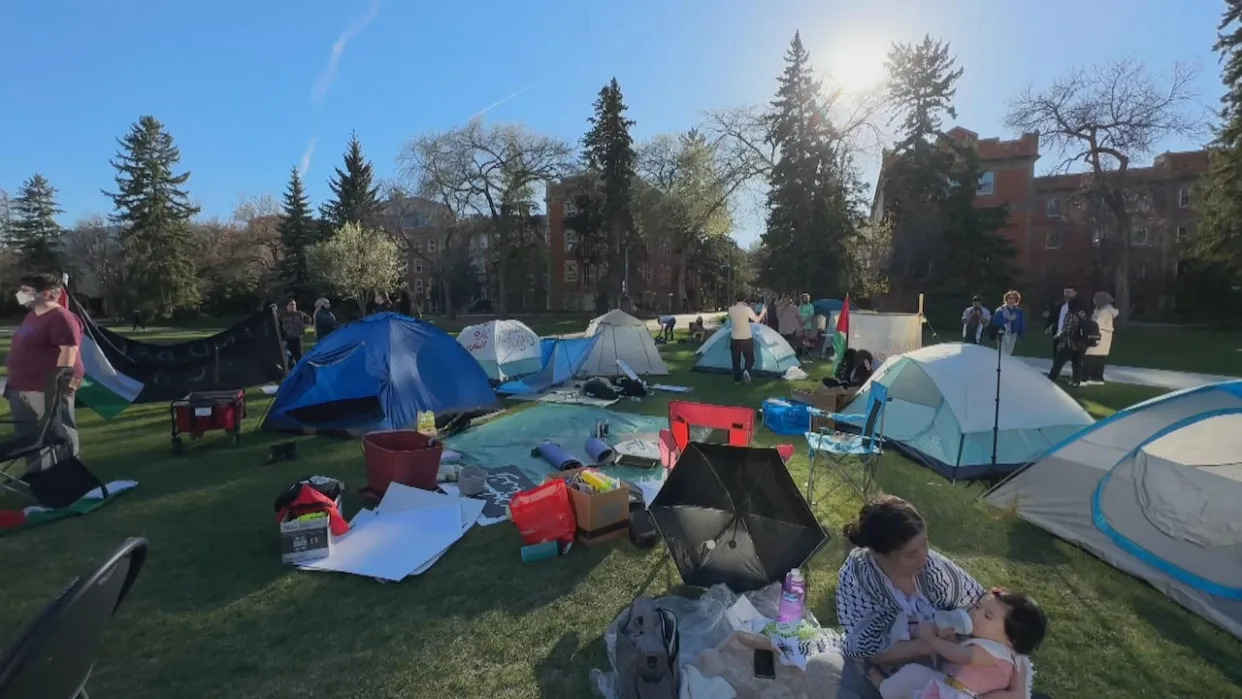
More than 100 students, staff and supporters gathered at the University of Alberta on May 9 to start a Pro-Palestinian encampment in support of Gaza. Edmonton Police dismantled the encampment on May 11. (Mrinali Anchan/CBC - image credit)
University of Alberta staff and student associations are calling for an independent investigation into the forceful removal of pro-Palestinian protesters in mid-May.
Representatives of the University of Alberta Students' Union and various staff associations said they met with university leaders Wednesday and demanded a third-party investigation into decisions that led to the Edmonton Police Service being called on May 11 to remove protesters from campus.
"There continue to be discrepancies between senior leadership and the protesters' account of what happened on May 11," Kristine Smitka, vice-president of the Academic Staff Association at the U of A, told reporters Wednesday.
"And it's really a third-party, independent investigation [that] will allow this community to start to move forward and heal from the events which transpired."
On May 9, more than 100 students, staff and supporters gathered at the school's main quad to show support for Gaza while calling on the university to disclose and divest from investments with Israeli institutions.
Smitka said Wednesday's meeting was with U of A president and vice-chancellor Bill Flanagan and other senior leaders, including Verna Yui, Todd Gilchrist and Melissa Padfield.
Smitka said a thorough investigation could be lengthy but said the process was necessary to gather testimonies from all stakeholders, including protesters and senior leadership.
In a public statement issued May 12, Flanagan said there were "serious and potentially life-threatening risks associated with the encampment." He said protesters did not act on a request to remove wood pallets and that 17 were found within 150 metres of the encampment, which a fire inspector declared was a fire hazard.
Demonstrators have said pallets had been removed and there was no violent behaviour in the encampment. Videos taken by demonstrators on May 11 and posted to social media showed officers using batons. At one point, gas started forming during the sweep.
Police have said they were in contact with the university for several days about safety concerns before being called in to clear the camp. Officers used pepper balls — non-lethal ammunition filled with pepper spray, similar to a paintball — and a muzzle blast containing pepper spray.
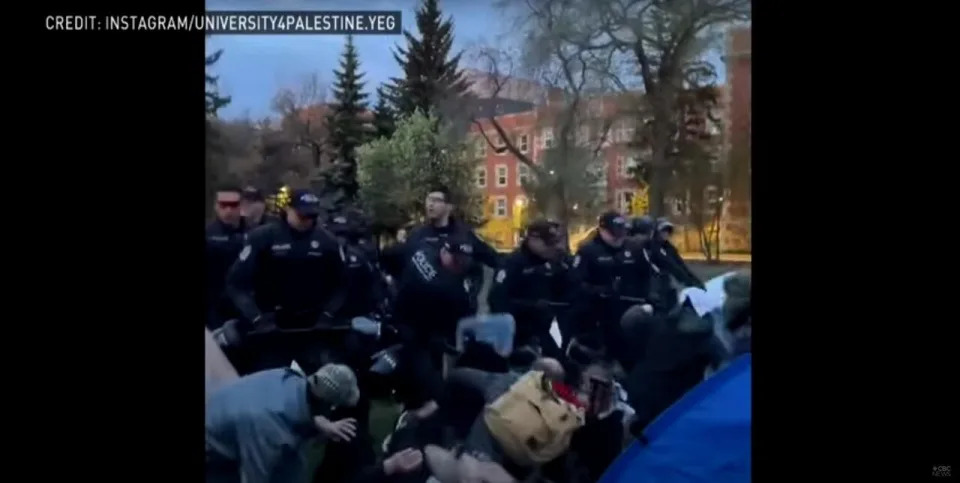
Videos taken by demonstrators on May 11, which were posted to social media, showed officers using batons and, at one point, gas started forming during the sweep.
Videos taken by demonstrators on May 11, which were posted to social media, showed officers using batons and, at one point, gas started forming during the sweep. (Instagram/University4Palestine.YEG)
Three men were arrested and police said no serious injuries were reported. The demonstrators have said four students were injured, including one who was sent to hospital.
"I think that our group would like to better understand what evidence was used to make this decision that the protest was an unsafe protest," Smitka said.
"What de-escalation techniques were used? One thing of great concern to us is that no senior leadership official walked into the quad to engage in dialogue with the protesters."
'Erasing history' not an option
Students' union president Lisa Glock said the union is working toward creating a mechanism for students' demands to be heard.
"Erasing history isn't something that we're interested in," Glock said when asked by media about the lasting impact on the university community.
"We want to analyze it, see why things happened and learn from it."
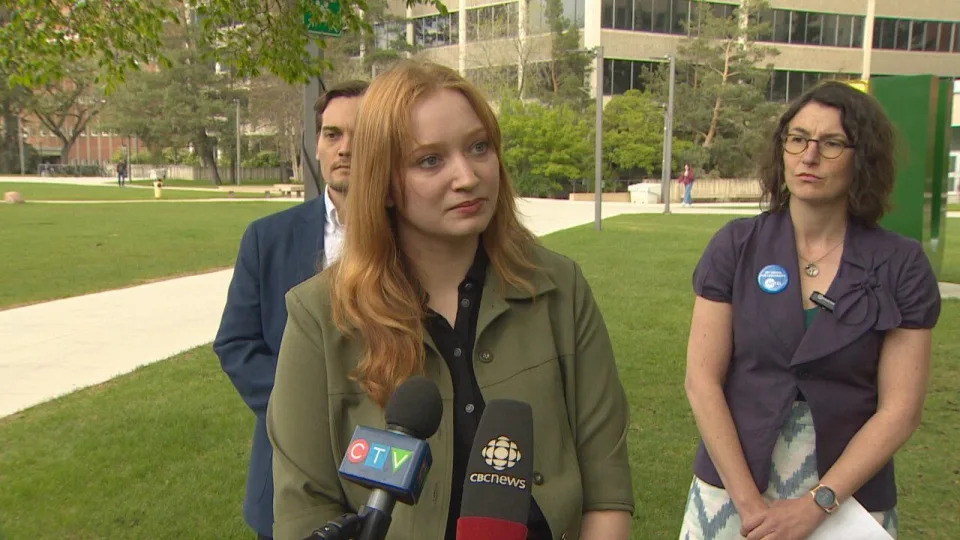
Students' union president Lisa Glock said the union is working toward creating a mechanism for students' demands to be heard.
Students' union president Lisa Glock said the union is working toward creating a mechanism for students' demands to be heard. (Jamie McCannel/CBC)
CBC has requested comment from the U of A regarding the investigation request and the presence of leadership during the encampment.
Smitka said another meeting with leadership is scheduled in two weeks.
"We want to think through what can be improved, especially any de-escalation techniques that can be further embedded within university policy to address protests on campus to ensure that something like this never happens at the U of A again."
No comments:
Post a Comment